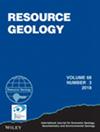Assimilation and extensive metasomatism of agpaitic rocks from the transitional layered kakortokite, Ilímaussaq Intrusion, South Greenland
IF 0.8
4区 地球科学
Q3 GEOLOGY
引用次数: 0
Abstract
Abstract The peralkaline Ilímaussaq Intrusion of the Gardar Province in South Greenland consists of several intrusive phases that have been related to different magmatic pulses and igneous cumulate processes. The lowermost exposed part of the intrusion is kakortokite, a eudialyte‐nepheline syenite, with distinctive sub‐horizontal layering which passes upwards into lujavrite, a fine‐grained melanocratic eudialyte‐nepheline syenite. Along the contact between kakortokite and lujavrite lies a transitional layered kakortokite, which has been defined previously based on textural and mineralogical criteria. However, published literature presents conflicting descriptions of this sequence in terms of thickness, layering, contacts, and mode of origin. Our own and previous field and petrographic investigations suggest that parts of the eudialyte‐rich zones in the transitional layered kakortokite comprise metasomatized and partially assimilated naujaite autoliths, a sodalite‐rich eudialyte nepheline syenite, detached probably from the roof of the intrusion. Here, we focus on the nature of the transitional layered kakortokite and conclude, in contrast to the conventional model, that it was formed by metasomatic transformation and assimilation of naujaite autoliths. We propose that the breakdown and replacement of sodalite locally increased chlorine and sodium concentrations, which may have catalyzed the precipitation of eudialyte. In detail, we suggest that the uppermost four eudialyte‐rich horizons were strongly influenced by metasomatic processes caused by mineral‐melt reaction, and were not simply the result of conventional igneous magmatic cumulate formation, as has been inferred for the underlying kakortokite layered units. Recognition of a significant metasomatic process has important bearing on the distribution of minerals with specific elements, like REE in eudialyte, both from a petrological and an economic perspective.

南格陵兰岛Ilímaussaq侵入区过渡性层状kakortokite中绿质岩的同化和广泛交代作用
南格陵兰加尔达省的过碱性Ilímaussaq侵入岩由多个侵入期组成,这些侵入期与不同的岩浆脉冲和火成岩堆积作用有关。侵入体最下部的暴露部分为kakortokite,这是一种双透光石-霞石正长岩,具有独特的亚水平层状,向上进入一种细粒黑晶双透光石-霞石正长岩。在kakortokite和绿黄铁矿之间的接触处存在过渡性层状kakortokite,这是先前根据结构和矿物学标准定义的。然而,已发表的文献在厚度、分层、接触和起源模式方面对这一序列提出了相互矛盾的描述。我们自己和之前的野外和岩石学研究表明,过渡性层状kakortokite中部分富钠析岩带由交代和部分同化的钠辉石自长岩组成,这是一种富钠析岩的榴辉石正长岩,可能与侵入体顶部分离。本文对过渡性层状岩的性质进行了研究,并与传统模式不同,认为其是由钠辉石自岩的交代转化和同化作用形成的。我们认为钠石的分解和替换局部增加了氯和钠的浓度,这可能催化了析液的沉淀。详细地说,我们认为最上面的四个富含双溶物的层位受到矿物熔融反应引起的交代过程的强烈影响,而不仅仅是传统的火成岩岩浆堆积形成的结果,正如对下伏的kakortokite层状单元所推断的那样。从岩石学和经济学的角度来看,认识一个重要的交代过程对具有特定元素的矿物的分布具有重要的意义,如在透析液中REE。
本文章由计算机程序翻译,如有差异,请以英文原文为准。
求助全文
约1分钟内获得全文
求助全文
来源期刊

Resource Geology
地学-地质学
CiteScore
2.30
自引率
14.30%
发文量
18
审稿时长
12 months
期刊介绍:
Resource Geology is an international journal focusing on economic geology, geochemistry and environmental geology. Its purpose is to contribute to the promotion of earth sciences related to metallic and non-metallic mineral deposits mainly in Asia, Oceania and the Circum-Pacific region, although other parts of the world are also considered.
Launched in 1998 by the Society for Resource Geology, the journal is published quarterly in English, making it more accessible to the international geological community. The journal publishes high quality papers of interest to those engaged in research and exploration of mineral deposits.
 求助内容:
求助内容: 应助结果提醒方式:
应助结果提醒方式:


